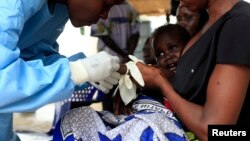The aid agency Oxfam reports the rising price of water in South Sudan is putting more people at risk from a cholera outbreak. This is just one of the ways the economic impact from an ongoing civil conflict has worsened a humanitarian crisis in the country.
The World Health Organization says 33 people in South Sudan’s capital have died from cholera since June, out of 790 confirmed cases. The origin of the epidemic has been traced back to a displaced person’s camp in Juba, where crowded, unsanitary conditions likely fueled the outbreak.
But Oxfam Country Director Zlatko Gegic said the economic impact of civil conflict has made the situation worse.
“We have seen skyrocketing prices of water, food and commodities. At the end, people are struggling to put food on the table and are paying less and less attention to clean water. Not because they want to, but because they have been put in the situation,” said Gegic.
Ongoing violence
Prices for basic goods have risen in South Sudan as 19 months of violence has disrupted oil production, the key driver of the economy.
Gegic said many families in Juba typically rely on private suppliers for clean water and the rising price of fuel has increased the cost to consumers.
“Those poorer neighborhoods of Juba are hit hardest, and some of those families have no means to buy any clean water, any more so they are resorting to dramatic measures, like drinking water from untreated resources, sometimes straight from the River Nile,” he said.
Cholera is transmitted through contaminated water or food. It is treatable in most cases, but can be deadly.
Gegic said an intervention by aid agencies and South Sudan’s Ministry of Health has helped control this outbreak, but he said long-term investment in clean water and health infrastructure is needed to prevent a repeat of the situation.




